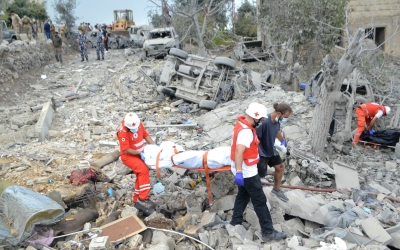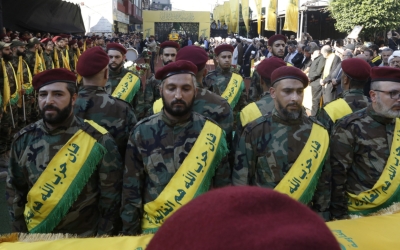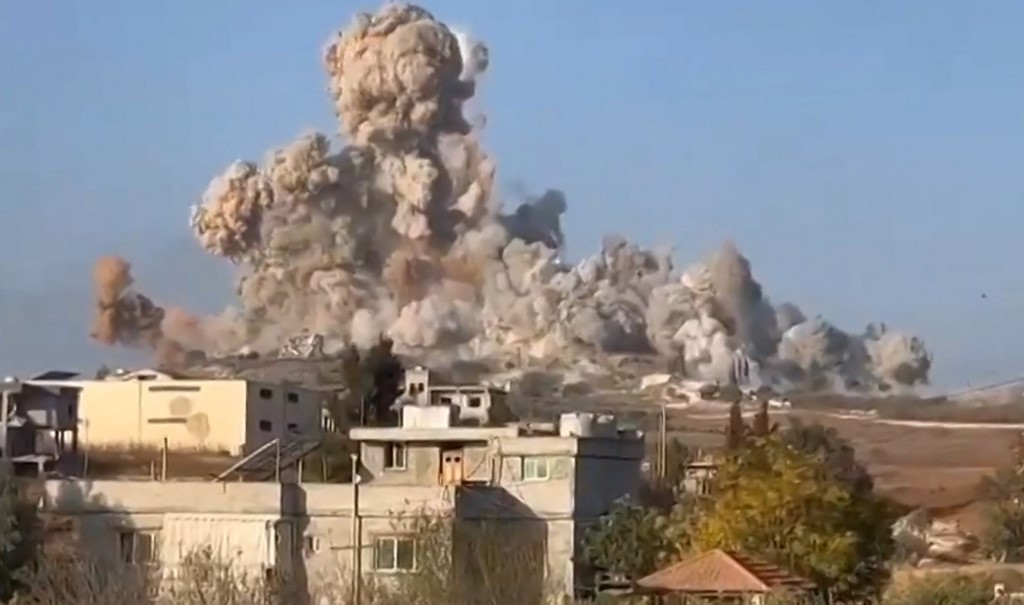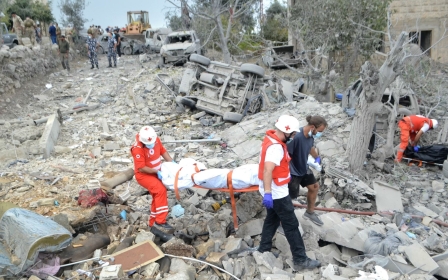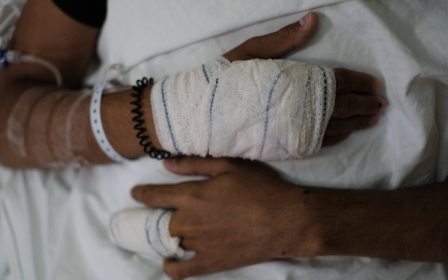How the US dived into a war to reshape Lebanon's balance of power
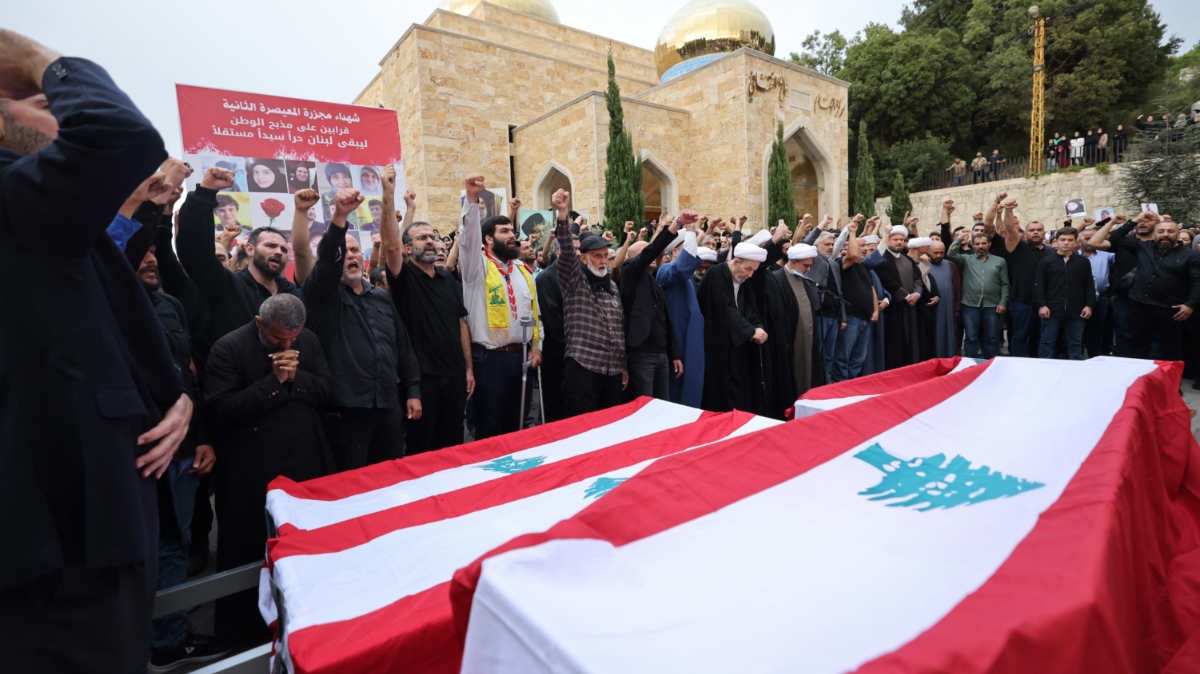
After having failed to achieve a ceasefire in Lebanon, the Biden administration is betting on the blunt force of Israel’s military to rewrite the balance of power in the Mediterranean state against Hezbollah.
With a tight US presidential election less than four weeks away, the US’s move is not so much a strategic gambit as it is a symptom of the White House’s concession that American diplomacy could not stave off a full-scale Israeli offensive or Hezbollah's cross-border fire.
Paul Salem, vice president at the Washington-based Middle East Institute, told MEE that the Biden administration's approach to Lebanon was “a stunning admission that the US hasn’t been able to influence the actions of its almost totally dependent ally, Israel”.
“So now, US policy in Lebanon has become an extension of Israeli policy.”
The US was frustrated by Hezbollah's year-long insistence to link a truce with Israel to an elusive ceasefire in Gaza. That handwringing led US envoy Amos Hochstein to issue a blunt warning to Hezbollah in June, that the US would back Israel's ground offensive if a diplomatic deal was not reached, MEE reported at the time.
New MEE newsletter: Jerusalem Dispatch
Sign up to get the latest insights and analysis on Israel-Palestine, alongside Turkey Unpacked and other MEE newsletters
But the Biden administration had a jaded view of Lebanon from the beginning. During 20 years of cold peace between Israel and Lebanon, US officials watched Hezbollah, Iran’s most powerful ally, come to dominate the country's political and military space.
The former George W Bush administration backed Israel for one month while it pounded Lebanon during its 2006 war with Hezbollah. Israel destroyed swaths of infrastructure, including Beirut's airport. But the Israeli military got bogged down in southern Lebanon. The US pivoted to spearheading a ceasefire deal that became UN Security Council resolution 1701.
At the time, Bush trumpeted the ceasefire as addressing “the root cause of the problem” that started the 2006 war.
The resolution called for the withdrawal of Hezbollah fighters from southern Lebanon to the Litani River and the group's eventual disarmament. Yet Hezbollah claimed a win.
“How can you claim victory when at one time you were a state within a state, safe within southern Lebanon, and now you’re going to be replaced with a Lebanese army and an international force?” Bush said at the time.
Breaking grip of Hezbollah
When the 2006 war ended, the US’s Gulf Arab allies poured billions of dollars into Lebanon to reconstruct Beirut, a degraded but alluring destination in the Middle East. Lebanon's economy boomed thanks to tourism and a profligate banking sector that would later crash.
Meanwhile, the US started funding the non-sectarian Lebanese Armed Forces (LAF). In the last 20 years, it gave more than $2.5bn in support to the LAF (which enjoys broad support across sectarian lines), becoming its single largest donor.
Israel continued to violate Lebanon's airspace in defiance of 1701, but Israeli troops withdrew from all of Lebanon's internationally recognised territory and the UN's peacekeeping force in southern Lebanon, the United Nations Interim Force in Lebanon (Unifil), was bolstered.
But Hezbollah grew and the LAF was never deployed south in a meaningful way.
With funds from Iran, Hezbollah filled a socio-economic vacuum by expanding services among Lebanon’s impoverished and disenfranchised Shia community, which saw little benefit from the new riches of Lebanon's western-oriented middle class and elite.
In 2008, Hezbollah reminded everyone that it was the dominant force in Lebanon thanks to its military arsenal. It clashed with Sunni fighters in West Beirut after Lebanon’s government tried to reduce some of Hezbollah’s influence.
The US shrugged off Lebanon's internal squabbling, but then Hezbollah projected its power abroad, giving the ground troops necessary for Syria's Assad to turn the tide of his country’s civil war, and advising the Houthis in Yemen.
A former senior US official told Middle East Eye that Biden’s senior advisors, those working closely on Lebanon in the national security cabinet, realised that 1701 was a US failure.
"It sounded nice on paper, but it could not be implemented. The US doesn't want to push for an early ceasefire and make the same mistake,” the official said on the condition of anonymity.
The State Department has publicly said as much. Asked earlier this month if the US still supported a ceasefire in Lebanon, spokesperson Matthew Miller said that the situation on the ground had changed with Hezbollah's leadership degraded.
“What we want to see come out of this situation, ultimately, is Lebanon able to break the grip that Hezbollah has had on the country - more than a grip, break the stranglehold that Hezbollah has had on the country and remove [the] Hezbollah veto over a president.”
'Battleship row'
Israel's US-backed military has scored impressive victories against Hezbollah.
It severed Hezbollah’s communications network by exploding thousands of pagers and walkie-talkies on members this summer. Not only did Israel kill former leader Hassan Nasrallah, but it assassinated his underlings and likely successors rapidly. US officials who spoke with MEE said Israel's claim that they have destroyed 50 percent of the group's missile arsenal is roughly valid.
“Three weeks ago, Hezbollah was a juggernaut equivalent to a ballistic missile submarine for Iran, now it's on battleship row,” Aram Nerguizian, a nonresident senior associate at the Center for Strategic and International Studies and expert on Arab militaries, told MEE.
US officials also feel reassured. So far, Israel has inflicted devastating losses on Hezbollah, without taking serious casualties or seeing Israeli cities hit with massive air strikes on the level many feared.
Some analysts say Hezbollah appears to be holding its top missiles in reserve.
Meanwhile, US officials have so far breathed a sigh of relief that their ally isn’t getting bogged down in Lebanon.
Three US officials familiar with Israel’s day-to-day military operations in Lebanon who spoke to MEE said they appear to have learned from the 2006 war - when they got bogged down sending tank columns and swarms of troops across the border.
“This is not rapid manoeuvre warfare with massive infantry and tank brigades. Israel is maximising its AI technology and a heavy reliance on ISR and special forces. The risk, however, is that this snowballs into a gruelling occupation,” Nerguizian said.
Seeds of 'new civil war'
Prime Minister Benjamin Netanyahu has called on Lebanese to rise up against Hezbollah, and opposition leader Yair Lapid has even revived talk of a South Lebanon Army (SLA) 2.0. The first iteration of the SLA was a Christian Lebanese militia that lorded over southern Lebanon during the Israeli occupation.
Intelligence and defence officials say much of Israel's rhetoric appears geared for a US and Israeli audience, and caution that Hezbollah is down but not out.
“I don’t think we are going to see Hezbollah destroyed. In the 1980s, Hezbollah didn't need rockets and drones to kick out the US and Israel," Douglas London, a retired CIA senior operations officer, who served extensively in the Middle East, told MEE.
Even more so than in Gaza, the US appears more deeply tied to Israel's offensive on Lebanon because it smacks of great power competition with its chief Middle East rival, Iran.
Israel and the US are more isolated on the international stage. Nato ally France has even called for an arms embargo on Israel.
And Israel’s offensive has been devastating. Lebanon’s health ministry says Israeli bombing has killed more than 2,300 people and injured close to 11,000 since October 2023, with the majority of those casualties happening since Israel’s September 2024 escalation against Lebanon.
While neighbourhoods associated with Hezbollah have been some of the hardest hit, the air strikes have struck towns and areas well beyond the group’s support base.
On Monday, an Israeli strike on a mainly Christian village in northern Lebanon killed 23 people, including at least 12 women and two children, according to Lebanese health officials.
Israeli strikes have displaced roughly 1.2 million people and over a quarter of the entire country was now under forced displacement notice, according to the UN.
Hezbollah is not just the world’s most heavily armed non-state actor but is intimately tied to the Lebanese Shias' social fabric, giving it huge influence in a country deeply polarised along religious and economic lines.
Fawaz Gerges, a professor of international relations at the London School of Economics, told MEE that the Biden administration had “given a green light” to an Israeli offensive that has put Lebanon on the verge of a “devastating new civil war”.
'Three weeks ago Hezbollah was a juggernaut equivalent to a ballistic missile submarine for Iran, now its on battleship row'
- Aram Nerguizian, CSIS
“What Israel is trying to do is drive a wedge between the Shia and other sects," said Gerges.
"The displacement of 1.2 million Shia is designed to trigger social upheaval. The government is broke. What happens to 1.2 million displaced people? Hezbollah will have boundless young men to fight.”
Even military experts admit that Israel’s tactical take-down of Hezbollah has to be tethered to some kind of political end.
For its part, the group has shown that it has plenty of fight left in it. On Sunday, it launched a precise drone attack at a military base in central Israel that killed four soldiers and wounded dozens more.
On Tuesday, Hezbollah's deputy chief Naim Qassem suggested Hezbollah was willing to negotiate with Israel, but also struck a defiant tone.
“I am telling [Israel], the solution is a ceasefire, and after the ceasefire, according to the indirect agreement, the [Israeli] settlers will return north,” he said, referring to the roughly 60,000 Israelis in northern Israel. Israel's war goal is to have them returned to the north.
Hezbollah began firing at northern Israel on 8 October, after Hamas launched its attack on southern Lebanon, killing over 1,200 people and seeing over 200 taken to Gaza as hostages.
“We are not speaking from a position of weakness. If the Israelis do not want that, we will continue," he added.
Analysts say that Hezbollah appears desperate for a deal.
“Hezbollah genuinely wants a ceasefire because they are struggling. Netanyahu doesn’t want one and he is the one driving events in Lebanon,” London told MEE.
Pro-West president
Three US officials familiar with the Biden administration’s approach to Lebanon said the White House believes a key marker of whether Hezbollah is serious about a ceasefire is seeing it drop its veto over a president.
Lebanon has been stuck with a rudderless caretaker government since 2022. Under Lebanon's confessional system of government the president must be a Christian, the prime minister a Sunni muslim and the speaker of parliament a Shia Muslim.
Hezbollah has insisted Suleiman Frangieh, scion of a Maronite Christian family and close ally of Syria’s Bashar al-Assad and Iran, hold the presidential post, while its opponents have called for a pro-West candidate.
Lebanon has 18 officially recognised sects - with the main ones being Sunni Muslims, Shia Muslims, and Christians. To begin the process of selecting a president, Lebanon’s speaker of parliament, Nabih Berri, has to call a session of parliament to vote.
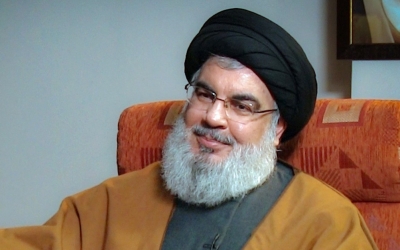
Unlike in Gaza, where the US has no ground game with local actors, a swath of Lebanon’s political class wants the country aligned with the US.
The US is trying to get an old coalition of Christian, Sunni Muslim and Druze political parties - once dubbed the 14 March alliance - to compromise with some Shia members of parliament to back a new president.
Lebanese caretaker Prime Minister Najib Mikati said on Tuesday that he received assurances from the US it had convinced Israel to limit strikes on Beirut.
A senior Arab official familiar with a phone call on Friday between Mikati and US Secretary of State Antony Blinken confirmed the promise, which he said the US hoped would facilitate the election of a president.
But that promise depends on Israel following through on US assurances, which hasn't happened yet.
Earlier this month, Druze, Shia and Sunni political leaders met in Beirut to discuss potential candidates, including Joseph Aoun, head of the LAF, and Jihad Azour, a senior banker at the International Monetary Fund.
'The Americans and the French are trying very hard to push a president down the throat of the Shia power brokers. They are saying you lost'
- Fawas Gerges, London School of Economics
Gerges said the US's push is only adding more fuel to the fire. “The Americans and the French are trying very hard to push a president down the throat of the Shia power brokers. They are saying you lost."
In Lebanon, electing a pro-western leader is easier than making sure he stays alive.
In 1982, Lebanon’s pro-US right-wing Christian president-elect Bachir Gemayel was assassinated in a bombing. In 2005, pro-western and anti-Hezbollah Sunni Muslim Prime Minister Rafik Harari was assassinated in a bombing. A UN court indicted four Hezbollah members for the killing.
The US hopes a president will showcase enough national unity so that Lebanon’s army can deploy to southern Lebanon and execute the failed promise of Security Council resolution 1701.
However, some analysts say with its army enjoying air superiority and limited casualties, Israel might be content with continuing to pound Lebanon.
“Israel isn’t interested in 1701. I think they will continue to hit Hezbollah as long as they can,” Salem told MEE.
Right now, analysts say US diplomacy and internal Lebanese power wrangling are going to be secondary to what happens in the hills of southern Lebanon.
“The ultimate balance of power in Lebanon is now going to be determined on the battlefield,” Nerguizian said.
Middle East Eye delivers independent and unrivalled coverage and analysis of the Middle East, North Africa and beyond. To learn more about republishing this content and the associated fees, please fill out this form. More about MEE can be found here.


